龙书第二章答案Snooze
- 格式:doc
- 大小:75.00 KB
- 文档页数:8
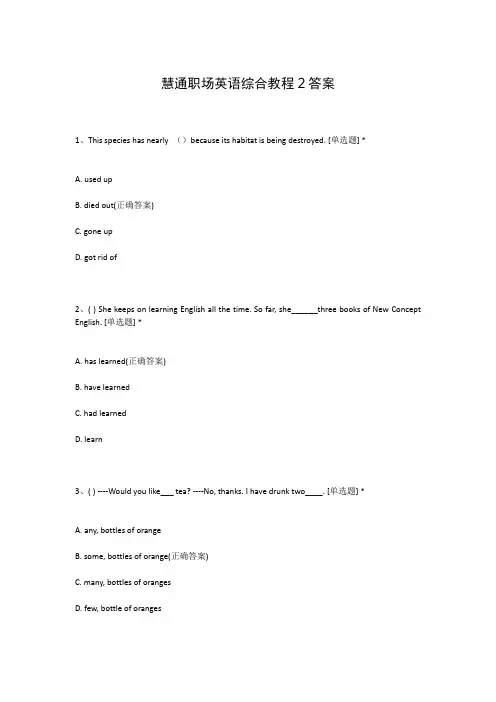
慧通职场英语综合教程2答案1、This species has nearly ()because its habitat is being destroyed. [单选题] *A. used upB. died out(正确答案)C. gone upD. got rid of2、( ) She keeps on learning English all the time. So far, she______three books of New Concept English. [单选题] *A. has learned(正确答案)B. have learnedC. had learnedD. learn3、( ) ----Would you like___ tea? ----No, thanks. I have drunk two____. [单选题] *A. any, bottles of orangeB. some, bottles of orange(正确答案)C. many, bottles of orangesD. few, bottle of oranges4、48.—________ is your new skirt, Lingling?—Black. [单选题] *A.HowB.What colour(正确答案)C.WhichD.Why5、_______ hard, _______ you’ll fail in the exam. [单选题] *A. Studying; forB. Study; or(正确答案)C. To study; andD. Study; and6、I didn't hear _____ because there was too much noise where I was sitting. [单选题] *A. what did he sayB. what he had said(正确答案)C. what he was sayingD. what to say7、You should take the medicine after you read the _______. [单选题] *A. linesB. wordsC. instructions(正确答案)D. suggestions8、Tom didn’t _______ his exam again. It was a pity. [单选题] *A. winB. pass(正确答案)C. beatD. Fail9、Nearly everything they study at school has some practical use in their life, but is that the only reason _____ they go to school? [单选题] *A. why(正确答案)B. whichC. becauseD. what10、Mary's watch is more expensive than _____. [单选题] *A. Susan's(正确答案)B. that of Susan'sC. that of SusanD. Susan11、_______ songs is my favorite. [单选题] *A. To Singing EnglishB. Singing English(正确答案)C. Singings EnglishD. Sing English12、You can ask()is on duty there tonight. [单选题] *A. WhatB. whomC. whoever(正确答案)D. whomever13、29.There is a book in your left hand. What’s in your ___________ hand? [单选题] * A.the othersB.other (正确答案)C.anotherD.others14、Tom didn’t _______ his exam again. It was a pity. [单选题] *A. failB. winC. pass(正确答案)D. beat15、31.That's ______ interesting football game. We are all excited. [单选题] *A.aB.an(正确答案)C.theD./16、--All of you have passed the test!--_______ pleasant news you have told us! [单选题] *A. HowB. How aC. What(正确答案)D. What a17、—Who came to your office today, Ms. Brown?—Sally came in. She hurt ______ in P. E. class. ()[单选题] *A. sheB. herC. hersD. herself(正确答案)18、24.Kitty’s father ______ a policeman since 2 He loves helping people. [单选题] * A.isB.wasC.has been (正确答案)D.have been19、Actually, we don't know whether this news comes from a reliable()or not. [单选题] *A. source(正确答案)B. originC. basisD. base20、--Do you have a _______?--Yes, I _______ at a clothes store. [单选题] *A. work; workB. work; jobC. job; jobD. job; work(正确答案)21、—Whose book is it? Is it yours?—No, ask John. Maybe it’s ______.()[单选题] *A. hersB. his(正确答案)C. he’sD. her22、The car _______ after forty minutes driving, so he didn’t have the interview on time. [单选题] *A. broke down(正确答案)B. broke inC. broke outD. broke up23、The teachers don't make us wear a school uniform and we can wear _____ we like. [单选题] *A. anyB. thatC. asD. what(正确答案)24、Sometimes only()10 out of 500 or more candidates succeed in passing all the tests. [单选题] *A. as many asB. as few as(正确答案)C. as much asD. as little as25、In the closet()a pair of trousers his parents bought for his birthday. [单选题] *A. lyingB. lies(正确答案)c. lieD. is lain26、I walked too much yesterday and ()are still aching now. [单选题] *A. my leg's musclesB. my leg muscles(正确答案)C. my muscles' of legD. my legs' muscles27、Nearly two thousand years have passed _____ the Chinese first invented the compass. [单选题] *A. whenB. beforeC. since(正确答案)D. after28、Bob used ______ on the right in China, but he soon got used ______ on the left in England.()[单选题] *A. to drive; to driveB. to drive; drivingC. to driving; to driveD. to drive; to driving(正确答案)29、--Do you know _______ girl with long curly hair?--Yes. She is Mary. She plays _______ piano very well. [单选题] *A. a; /B. the; /C. the; the(正确答案)D. a; the30、Something must be wrong with the girl’s _______. She can’t hear clearly. [单选题] *A. ears(正确答案)B. noseC. armsD. eyes。
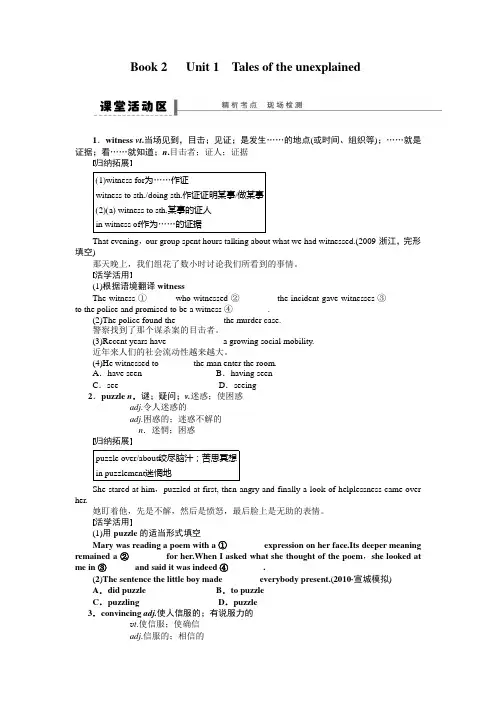
Book2 Unit 1Tales of the unexplained1.witness vt.当场见到,目击;见证;是发生……的地点(或时间、组织等);……就是证据;看……就知道;n.目击者;证人;证据归纳拓展(1)witnessfor为……作证witnesstosth./doingsth.作证证明某事/做某事(2)(a)witnesstosth.某事的证人inwitnessof作为……的证据Thatevening,ourgroupspenthourstalkingaboutwhatwehadwitnessed.(2009·浙江,完形填空) 那天晚上,我们组花了数小时讨论我们所看到的事情。
活学活用(1)根据语境翻译witnessThewitness①______whowitnessed②________theincidentgavewitnesses③________tothepo liceandpromisedtobeawitness④________.(2)Thepolicefoundthe__________themurdercase.警察找到了那个谋杀案的目击者。
(3)Recentyearshave____________agrowingsocialmobility.近年来人们的社会流动性越来越大。
(4)Hewitnessedto________themanentertheroom.A.haveseenB.havingseenC.seeD.seeing2.puzzle n.谜;疑问;v.迷惑;使困惑________adj.令人迷惑的________adj.困惑的;迷惑不解的__________n.迷惘;困惑归纳拓展puzzleover/about绞尽脑汁;苦思冥想inpuzzlement迷惘地Shestaredathim,puzzledatfirst, thenangryandfinallyalookofhelplessnesscameoverher.她盯着他,先是不解,然后是愤怒,最后脸上是无助的表情。
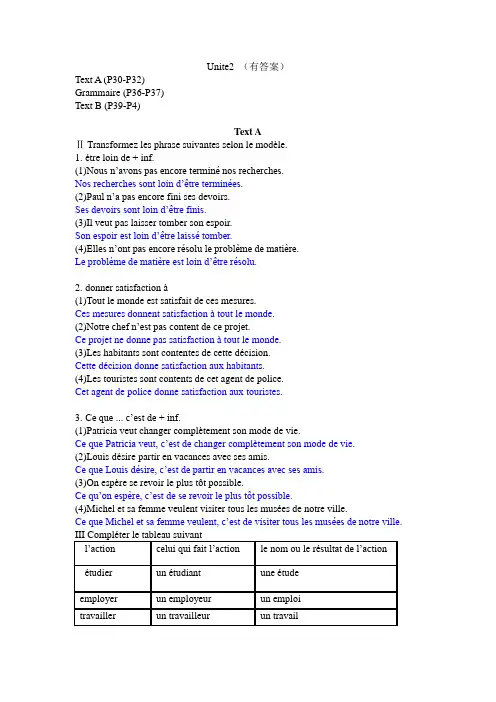
Unite2 (有答案)Text A (P30-P32)Grammaire (P36-P37)Text B (P39-P4)Text AⅡ Transformez les phrase suivantes selon le modèle.1.étre loin de + inf.(1)Nous n’avons pas encore terminé nos recherches.Nos recherches sont loin d’être terminées.(2)Paul n’a pas encor e fini ses devoirs.Ses devoirs sont loin d’être finis.(3)Il veut pas laisser tomber son espoir.Son espoir est loin d’être laissé tomber.(4)Elles n’ont pas encore résolu le problème de matière.Le problème de matière est loin d’être résolu.2.donner satisfaction à(1)Tout le monde est satisfait de ces mesures.Ces mesures donnent satisfaction à tout le monde.(2)Notre chef n’est pas content de ce projet.Ce projet ne donne pas satisfaction à tout le monde.(3)Les habitants sont contentes de cette décision.Cette décision donne satisfaction aux habitants.(4)Les touristes sont contents de cet agent de police.Cet agent de police donne satisfaction aux touristes.3.Ce que ... c’est de + inf.(1)Patricia veut changer complètement son mode de vie.Ce que Patricia veut, c’est de ch anger complètement son mode de vie.(2)Louis désire partir en vacances avec ses amis.Ce que Louis désire, c’est de partir en vacances avec ses amis.(3)On espère se revoir le plus tôt possible.Ce qu’on espère, c’est de se revoir le plus tôt possible.(4)Michel et sa femme veulent visiter tous les musées de notre ville.Ce que Michel et sa femme veulent, c’est de visiter tous les musées de notre ville. III Compléter le tableau suivantl’action celui qui fait l’action le nom ou le résultat de l’act ionétudier un étudiant une étudeemployer un employeur un emploitravailler un travailleur un travailparticiper un participant une participationchanter un chanteur une chansonvoyager un voyageur un voyagedemander un demandeur une demandechercher un chercheur une rechercheécrire un écrivain un écritIV Complétez avec un des verbes donnés : limiter , enfermer ,arrêter ,cesser ,renverser ,détruire1.L’hôpital où il est né a été détruit complètement par la guerre .2.Lès soldats ont enfermé/enfermaient des ennemis dans un cabinet avant que leurchef ne vienne.3.si la pluie cesse , j’irai à la librairie pour acheter quelques livres sur la technologiede pointe .4.nous avons arrêté un agent de police pour lui demander notre chemin .5.Faute d’attention , le client a renversé un verre sur la table .6.Il nous faut limiter la vitesse de voiture sur cette toute oùil y a tropd’automobiles.7.Ses études universitaires ont été arrêtées à cause d’une maladie grave .8.Tous les enfants ont cessé de crier dès que leur maîtresse était entrée dans la salle . V Traduisez en français :充满希望être plein d’espoir政府高级官员des hauts fonctionnaires du gouvernement幸运逃脱se sauver heureusement新的教育制度un nouveau système de l’éducation从不批评孩子ne jamais critiquer les enfants重新打开大门ouvrir de nouveau la porte修建一座城堡construire un château老板与员工的争论la discussion entre le patron et les employésⅥ.Complétez avec celui qui, que, dont ou ce qui, que, dont, etc.Invite-le avec ses parents!Fils: Papa, est –ce que je peux inviter des amis samedi soir ?Père: Fais ce que tu veux !Fils: On peut faire des brochettes dans le jardin?Père: Préparez ce qui vous plaît!Fils:Je peux t’emprunter un peu d’argent? Je dois aller au supermarché pour faire des courses.Père: Mon portefeuille est sur mon bureau. Prends ce dont tu as besoin.Fils: Dis! Je peux inviter tous mes amis?Père: Invite tous ceux que tu veux.Fils: Même celui qui s’est disputé avec toi l’autre jour?Père: C’est celui dont le père est inspecteur des impôts?Fils: Oui.Père: Alors invite-le avec ses parents .Ⅷ.thème1.罢工结束时,老板满足了工人们的要求。
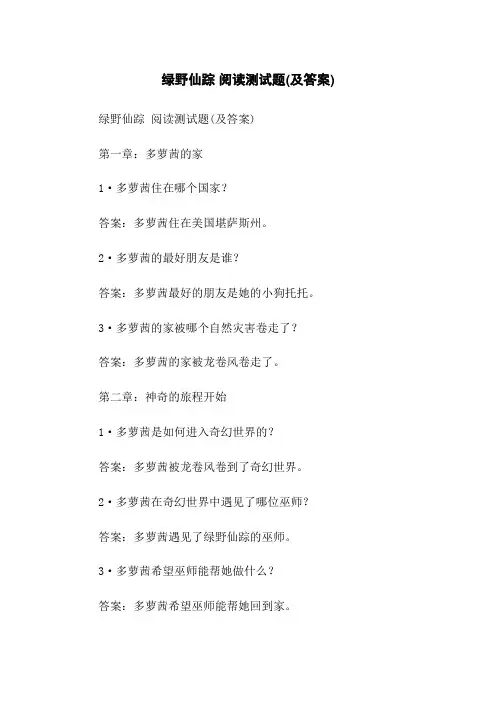
绿野仙踪阅读测试题(及答案) 绿野仙踪阅读测试题(及答案)第一章:多萝茜的家1·多萝茜住在哪个国家?答案:多萝茜住在美国堪萨斯州。
2·多萝茜的最好朋友是谁?答案:多萝茜最好的朋友是她的小狗托托。
3·多萝茜的家被哪个自然灾害卷走了?答案:多萝茜的家被龙卷风卷走了。
第二章:神奇的旅程开始1·多萝茜是如何进入奇幻世界的?答案:多萝茜被龙卷风卷到了奇幻世界。
2·多萝茜在奇幻世界中遇见了哪位巫师?答案:多萝茜遇见了绿野仙踪的巫师。
3·多萝茜希望巫师能帮她做什么?答案:多萝茜希望巫师能帮她回到家。
第三章:黄金大道1·多萝茜在黄金大道上遇见了哪个角色?答案:多萝茜在黄金大道上遇见了稻草人。
2·稻草人希望巫师能给他什么?答案:稻草人希望巫师能给他一个智慧的大脑。
3·多萝茜和稻草人一起前往哪个城市?答案:多萝茜和稻草人一起前往翠绿城。
第四章:银色森林1·多萝茜在银色森林中遇见了哪个角色?答案:多萝茜在银色森林中遇见了铁皮人。
2·铁皮人希望巫师能给他什么?答案:铁皮人希望巫师能给他一个心脏。
3·多萝茜、稻草人和铁皮人一起前往哪个城市?答案:多萝茜、稻草人和铁皮人一起前往锡切姆城。
第五章:狮子王国1·多萝茜、稻草人、铁皮人在狮子王国中遇见了谁?答案:多萝茜、稻草人、铁皮人在狮子王国中遇见了懦弱的狮子。
2·懦弱的狮子希望巫师能给他什么?答案:懦弱的狮子希望巫师能给他勇气。
3·多萝茜、稻草人、铁皮人和懦弱的狮子一起前往哪个城市?答案:多萝茜、稻草人、铁皮人和懦弱的狮子一起前往神秘城市。
第六章:巫师的真相1·在神秘城市,巫师告诉多萝茜们真相是什么?答案:巫师告诉多萝茜们真相是他是一个骗子,没有真正的魔法。
2·多萝茜和她的朋友们决定去找谁帮助她们?答案:多萝茜和她的朋友们决定去找女巫帮助她们。

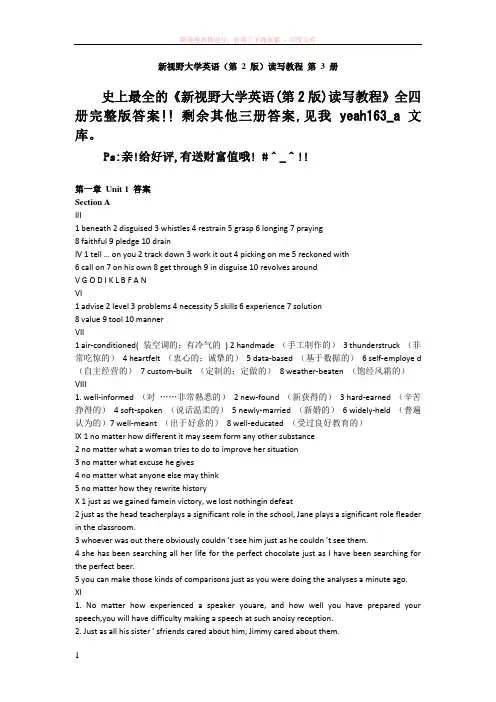
新视野大学英语(第2 版)读写教程第 3 册史上最全的《新视野大学英语(第2版)读写教程》全四册完整版答案!! 剩余其他三册答案,见我 yeah163_a 文库。
Ps:亲!给好评,有送财富值哦! #^_^!!第一章Unit 1 答案Section AIII1 beneath2 disguised3 whistles4 restrain5 grasp6 longing7 praying8 faithful 9 pledge 10 drainIV 1 tell … on you 2 track down 3 work it out 4 picking on me 5 reckoned with6 call on7 on his own8 get through9 in disguise 10 revolves aroundV G O D I K L B F A NVI1 advise2 level3 problems4 necessity5 skills6 experience7 solution8 value 9 tool 10 mannerVII1 air-conditioned( 装空调的;有冷气的)2 handmade (手工制作的)3 thunderstruck (非常吃惊的)4 heartfelt (衷心的;诚挚的)5 data-based (基于数据的)6 self-employe d (自主经营的)7 custom-built (定制的;定做的)8 weather-beaten (饱经风霜的)VIII1. well-informed (对……非常熟悉的)2 new-found (新获得的)3 hard-earned (辛苦挣得的)4 soft-spoken (说话温柔的)5 newly-married (新婚的)6 widely-held (普遍认为的)7 well-meant (出于好意的)8 well-educated (受过良好教育的)IX 1 no matter how different it may seem form any other substance2 no matter what a woman tries to do to improve her situation3 no matter what excuse he gives4 no matter what anyone else may think5 no matter how they rewrite historyX 1 just as we gained famein victory, we lost nothingin defeat2 just as the head teacherplays a significant role in the school, Jane plays a significant role fleader in the classroom.3 whoever was out there obviously couldn ’t see him just as he couldn ’t see them.4 she has been searching all her life for the perfect chocolate just as I have been searching for the perfect beer.5 you can make those kinds of comparisons just as you were doing the analyses a minute ago.XI1. No matter how experienced a speaker youare, and how well you have prepared your speech,you will have difficulty making a speech at such anoisy reception.2. Just as all his sist er ’ sfriends cared about him, Jimmy cared about them.3. Car manufacturers stamp a vehicle identification number at several places on new carsto help track down stolen vehicles.4. If you dare tell on me when the teacher gets back I won ’t say a wordto yo u any more.5. Some elderly people prefer to live on their ownwhile the great majority choose to live with their children.6. Here is something that needs to be reckoned with: how to get the necessary finances to establish the company.XII1. 每当有人帮了你,无论事情大小,无论他地位高低,你都应该对他说声“谢谢”。
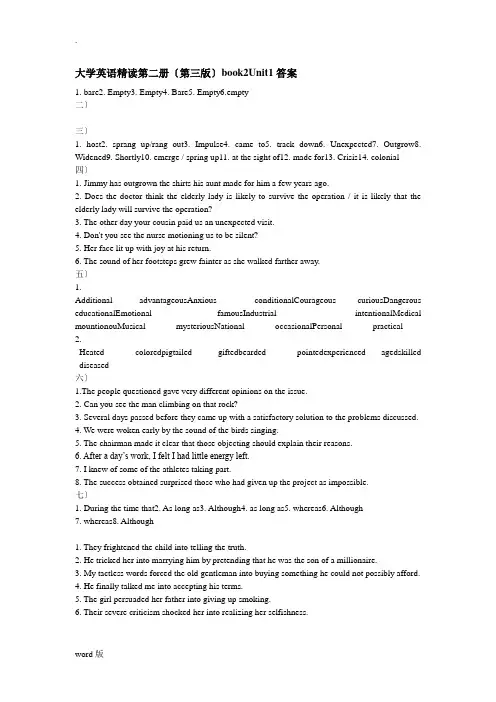
大学英语精读第二册〔第三版〕book2Unit1答案1. bare2. Empty3. Empty4. Bare5. Empty6.empty二〕三〕1. host2. sprang up/rang out3. Impulse4. came to5. track down6. Unexpected7. Outgrow8. Widened9. Shortly10. emerge / spring up11. at the sight of12. made for13. Crisis14. colonial四〕1. Jimmy has outgrown the shirts his aunt made for him a few years ago.2. Does the doctor think the elderly lady is likely to survive the operation / it is likely that the elderly lady will survive the operation?3. The other day your cousin paid us an unexpected visit.4. Don't you see the nurse motioning us to be silent?5. Her face lit up with joy at his return.6. The sound of her footsteps grew fainter as she walked farther away.五〕1.Additional advantageousAnxious conditionalCourageous curiousDangerous educationalEmotional famousIndustrial intentionalMedical mountionouMusical mysteriousNational occasionalPersonal practical2.Heated coloredpigtailed giftedbearded pointedexperienced agedskilled diseased六〕1.The people questioned gave very different opinions on the issue.2. Can you see the man climbing on that rock?3. Several days passed before they came up with a satisfactory solution to the problems discussed.4. We were woken early by the sound of the birds singing.5. The chairman made it clear that those objecting should explain their reasons.6. After a day’s work, I felt I had little energy left.7. I knew of some of the athletes taking part.8. The success obtained surprised those who had given up the project as impossible.七〕1. During the time that2. As long as3. Although4. as long as5. whereas6. Although7. whereas8. Although1. They frightened the child into telling the truth.2. He tricked her into marrying him by pretending that he was the son of a millionaire.3. My tactless words forced the old gentleman into buying something he could not possibly afford.4. He finally talked me into accepting his terms.5. The girl persuaded her father into giving up smoking.6. Their severe criticism shocked her into realizing her selfishness.1. Guests are to be back in the hotel by twelve o’clock.2. An investigation is to be made next week.3. I am to meet them at the airport.4. You are to finish your homework before you watch TV.5. The medicine is to be taken three times a day after meals.6. Bob and Susan are to get married in October八〕九〕十〕1.她砰地关上门,一声不吭地走了,他们之间那场争执就此完毕。
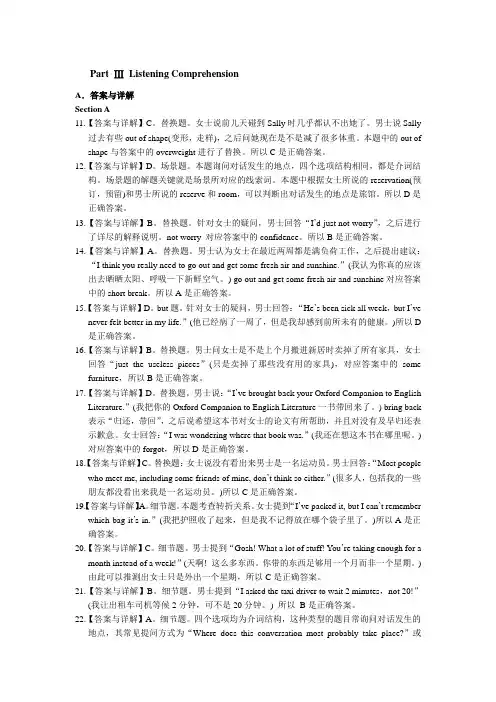
Part ⅢListening ComprehensionA.答案与详解Section A11.【答案与详解】C。
替换题。
女士说前儿天碰到Sally时几乎都认不出她了。
男士说Sally过去有些out of shape(变形,走样),之后问她现在是不是减了很多体重。
本题中的out of shape与答案中的overweight进行了替换。
所以C是正确答案。
12.【答案与详解】D。
场景题。
本题询问对话发生的地点,四个选项结构相同,都是介词结构。
场景题的解题关键就是场景所对应的线索词。
本题中根据女士所说的reservation(预订,预留)和男士所说的reserve和room,可以判断出对话发生的地点是旅馆。
所以D是正确答案。
13.【答案与详解】B。
替换题。
针对女士的疑问,男士回答“I’d just not worry”,之后进行了详尽的解释说明。
not worry 对应答案中的confidence。
所以B是正确答案。
14.【答案与详解】A。
替换题。
男士认为女士在最近两周都是满负荷工作,之后提出建议:“I think you really need to go out and get some fresh air and sunshine.”(我认为你真的应该出去晒晒太阳、呼吸—下新鲜空气。
) go out and get some fresh air and sunshine对应答案中的short break。
所以A是正确答案。
15.【答案与详解】D。
but题。
针对女士的疑问,男士回答:“He’s been sick all week,but I’venever felt better in my life.”(他已经病了一周了,但是我却感到前所未有的健康。
)所以D 是正确答案。
16.【答案与详解】B。
替换题。
男士问女士是不是上个月搬进新居时卖掉了所有家具,女士回答“just the useless pieces”(只是卖掉了那些没有用的家具),对应答案中的some furniture,所以B是正确答案。
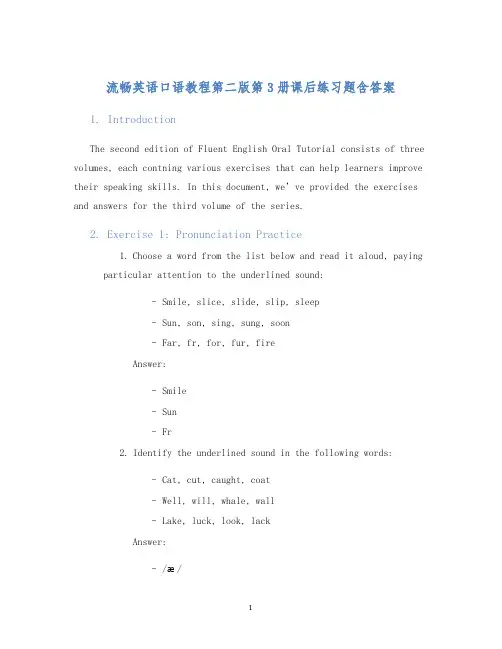
流畅英语口语教程第二版第3册课后练习题含答案1. IntroductionThe second edition of Fluent English Oral Tutorial consists of three volumes, each contning various exercises that can help learners improve their speaking skills. In this document, we’ve provided the exercises and answers for the third volume of the series.2. Exercise 1: Pronunciation Practice1.Choose a word from the list below and read it aloud, payingparticular attention to the underlined sound:–Smile, slice, slide, slip, sleep–Sun, son, sing, sung, soon–Far, fr, for, fur, fireAnswer:–Smile–Sun–Fr2.Identify the underlined sound in the following words:–Cat, cut, caught, coat–Well, will, whale, wall–Lake, luck, look, lackAnswer:–/æ/–/w/–/ʊ/3. Exercise 2: Vocabulary Practice1.Fill in the blank with the correct word from the list below:–Instead, although, although, however, despite–Strong, happy, cheap, busy, safe–She loves to travel by trn, ______ it can be a bit slow.–He didn’t speak English ______ he had been studying it for years.–She decided to go to the party anyway, ______ she was feeling tired.–He is a ______ swimmer who can easily swim long distances.–The traffic was heavy, but ______ she arrived at the meeting on time.Answer:–Although–Although–Despite–Strong–However2.Match the adjectives on the left with the appropriatepreposition on the right:–Proud–Interested–Afrd–Familiar–Ashamed–Of–In–About–With–ToAnswer:–Proud of–Interested in–Afrd of–Familiar with–Ashamed of4. Exercise 3: Speaking Practice1.Discuss the following questions with a partner:–What kind of music do you like to listen to, and why?–Have you ever been to a concert or live performance?If so, describe your experience.–Do you think music can have a positive effect on people’s mood? Why or why not?Answer:Answers to this exercise will vary depending on the learner’s responses to the questions.plete the following sentences about yourself, using the words from the list below:–Passionate, friendly, creative, organized, motivated–I am ______ about learning new things.–My friends often describe me as ______.–In my free time, I enjoy ______ activities, like pnting or writing.–I am good at ______ my work schedule and getting things done on time.–When I face a challenge, I am ______ to find a solution.Answer:–Passionate–Friendly–Creative–Organizing–Motivated5. ConclusionIn this document, we’ve provided the exercises and answers for the third volume of the Fluent English Oral Tutorial series. These exercises can be useful for learners looking to improve their speaking skills and expand their vocabulary.。
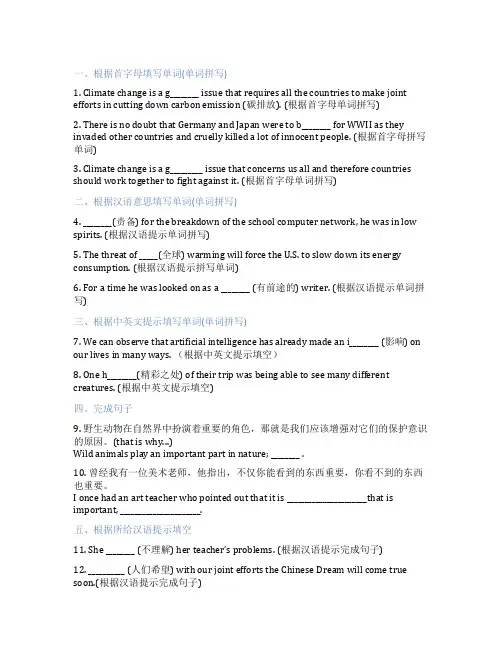
一、根据首字母填写单词(单词拼写)1. Climate change is a g________ issue that requires all the countries to make joint efforts in cutting down carbon emission (碳排放). (根据首字母单词拼写)2. There is no doubt that Germany and Japan were to b________ for WWII as they invaded other countries and cruelly killed a lot of innocent people. (根据首字母拼写单词)3. Climate change is a g_________ issue that concerns us all and therefore countries should work together to fight against it. (根据首字母单词拼写)二、根据汉语意思填写单词(单词拼写)4. ________(责备) for the breakdown of the school computer network, he was in low spirits. (根据汉语提示单词拼写)5. The threat of _____(全球) warming will force the U.S. to slow down its energy consumption. (根据汉语提示拼写单词)6. For a time he was looked on as a ________ (有前途的) writer. (根据汉语提示单词拼写)三、根据中英文提示填写单词(单词拼写)7. We can observe that artificial intelligence has already made an i________ (影响) on our lives in many ways. (根据中英文提示填空)8. One h________(精彩之处) of their trip was being able to see many different creatures. (根据中英文提示填空)四、完成句子9. 野生动物在自然界中扮演着重要的角色,那就是我们应该增强对它们的保护意识的原因。
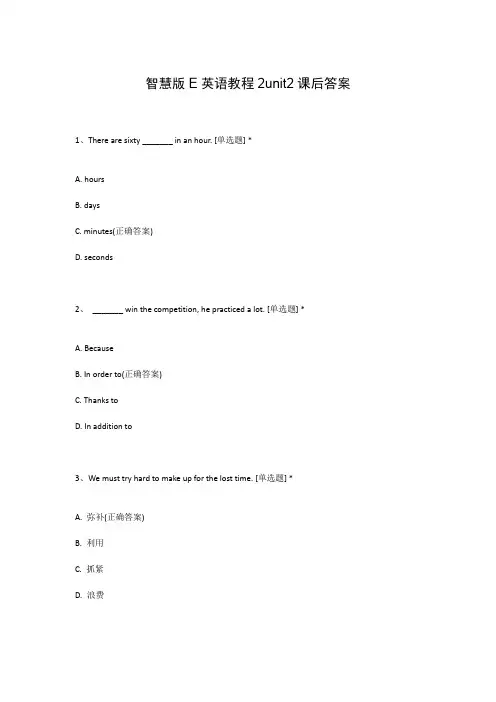
智慧版E英语教程2unit2课后答案1、There are sixty _______ in an hour. [单选题] *A. hoursB. daysC. minutes(正确答案)D. seconds2、_______ win the competition, he practiced a lot. [单选题] *A. BecauseB. In order to(正确答案)C. Thanks toD. In addition to3、We must try hard to make up for the lost time. [单选题] *A. 弥补(正确答案)B. 利用C. 抓紧D. 浪费4、My father and I often go ______ on weekends so I can ______ very well. ()[单选题] *A. swim; swimmingB. swims; swimC. swimming; swimmingD. swimming; swim(正确答案)5、( ) _____ New York _____ London have traffic problems. [单选题] *A. All…andB. Neither….norC. Both…and(正确答案)D. Either…or6、Tom’s mother will let him _______ traveling if he comes back?in five days. [单选题] *A. to goB. goesC. wentD. go(正确答案)7、I repeated my question several times. [单选题] *A. 到达B. 惊奇C. 重复(正确答案)D. 返回8、My camera is lost. I am ______ it everywhere.()[单选题] *A. looking atB. looking for(正确答案)C. looking overD. looking after9、73.The moonlight goes ____ the window and makes the room bright. [单选题] * A.acrossB.through(正确答案)C.overD.in10、Since we have _____ money left,we can't afford the expensive computer. [单选题] *A. a littleB. a fewC. little(正确答案)D. few11、People always _____ realize the importance of health _____ they lose it. [单选题] *A. not... untilB. don't... until(正确答案)C. /; untilD. /; not until12、(), it would be much more sensible to do it later instead of finishing it now. [单选题] *A. FinallyB. MildlyC. Actually(正确答案)D. Successfully13、—Excuse me, how long does it ______ to walk to the library? —About 15 minutes, I’m afraid.()[单选题] *A. take(正确答案)B. spendC. costD. pay14、61.How is online shopping changing our way? ? ? ? ? ? life? [单选题] *A.of(正确答案)B.inC.onD.for15、You needn’t _______ me. I’m old enough to take care of myself. [单选题] *A. worry about(正确答案)B. write downC. put awayD. wake up16、15.This kind of bread is terrible. I do not want to eat it ________. [单选题] * A.any more(正确答案)B.some moreC.no longerD.some longer17、My mother and my aunt are both _______. They work in a big supermarket. [单选题] *A. actressesB. doctorsC. salesmenD. saleswomen(正确答案)18、_______ your help, I passed the English exam. [单选题] *A. ThanksB. Thanks to(正确答案)C. Thank youD. Thank to19、The street was named _____ George Washington who led the American war for independence. [单选题] *A. fromB. withC. asD. after(正确答案)20、If it _______ tomorrow, I won’t go there. [单选题] *A. rains(正确答案)B. is rainingC. will rainD. would rain21、The carbon we produce when we breathe is much less than()produced by a car. [单选题] *A. oneB. itC. that(正确答案)D. those22、( ). The old man enjoys ______ stamps. And now he has1300 of them [单选题] *A. collectB. collectedC. collecting(正确答案)D. to collect23、Is there going to ______ a football match in the stadium next month?()[单选题] *A. beingB. haveC. be(正确答案)D. having24、He’s so careless that he always _______ his school things at home. [单选题] *A. forgetsB. leaves(正确答案)C. putsD. buys25、You have coughed for several days, Bill. Stop smoking, _______ you’ll get better soon. [单选题] *A. butB. afterC. orD. and(正确答案)26、You cannot see the doctor _____ you have made an appointment with him. [单选题] *A. exceptB.evenC. howeverD.unless(正确答案)27、—Can you play tennis?—______. But I can play basketball.()[单选题] *A. Yes, I canB. Yes, I doC. No. I can’t(正确答案)D. No, I don’t28、We should have breakfast every day to keep ______. [单选题] *A. healthB. healthy(正确答案)C. healthilyD. the healthy29、He kept walking up and down, which was a sure()that he was very worried. [单选题] *A. sign(正确答案)B. characterC. natureD. end30、We often go to the zoo _______ Saturday mornings. [单选题] *A. atB. inC. on(正确答案)D. of。
捷径英语2新智慧版课本答案您的姓名: [填空题] *_________________________________1.What gave Vinnie confidence to make her request of President Lincoln? [单选题] * A.Her aggressive personality.B.ls's encouraging remark.(正确答案)C.President Lincoln's gentle voice.D.Her interest in a challenging job.2.How did President Lincoln first respond to Vinnie's request? [单选题] * A.Pleased.B.Thrilled.C.Regretful.D.Doubtful.(正确答案)3.Vinnie confirmed her ability to make a full-length statue by highlighting________. [单选题] *A.her experience from other projectsB.her innocent childhood in the countryC.the heavy labor she had done before(正确答案)D.the skill she picked up in Wisconsin4.Vinnie wanted to choose the corner near the windows to ________. [单选题] * A.achieve effects of natural lightingB.keep all her tools within easy reachC.observe the President at a right angleD.avoid disturbing the President's work(正确答案)5.What message does the story convey? [单选题] *A.A strong-willed soul can reach his goal.(正确答案)B.Experience helps to promote excellence.C.Ups and downs make one strong.D.Devotion requires enthusiasm.6. 七选五第 1 题 [单选题] *A. I wasn't alone any longer.B.I enjoyed reading stories aloud.C.I was invited to play with another kid.D.I loved the colorful photographs in the books.E.Another habit I formed early was being outdoors.F.Thus,I began my lifelong interest in making things.G.My older brother couldn't be bothered to play with me.(正确答案)7.七选五第 2 题 [单选题] *A.I wasn't alone any longer.B.I enjoyed reading stories aloud.C.I was invited to play with another kid.D.I loved the colorful photographs in the books.(正确答案) E.Another habit I formed early was being outdoors.F.Thus,I began my lifelong interest in making things.G.My older brother couldn't be bothered to play with me.8.七选五第3题 [单选题] *A.I wasn't alone any longer.(正确答案)B.I enjoyed reading stories aloud.C.I was invited to play with another kid.D.I loved the colorful photographs in the books.E.Another habit I formed early was being outdoors.F.Thus,I began my lifelong interest in making things.G.My older brother couldn't be bothered to play with me.9.七选五第 4 题 [单选题] *A.I wasn't alone any longer.B.I enjoyed reading stories aloud.C.I was invited to play with another kid.D.I loved the colorful photographs in the books.E.Another habit I formed early was being outdoors.F.Thus,I began my lifelong interest in making things.(正确答案) G.My older brother couldn't be bothered to play with me.10.七选五第5题 [单选题] *A.I wasn't alone any longer.B.I enjoyed reading stories aloud.C.I was invited to play with another kid.D.I loved the colorful photographs in the books. E.Another habit I formed early was being outdoors.(正确答案) F.Thus,I began my lifelong interest in making things. G.My older brother couldn't be bothered to play with me.完型填空1. [单选题] *A.reliefB.targetC.reason.(正确答案)D.case2. [单选题] *A.admit(正确答案)B.believeC.meanD.realize3. [单选题] *A.graduallyB.constantly(正确答案)C.temporarilyD.casually4. [单选题] * A.resultB.dangerC.methodD.truth(正确答案)5. [单选题] * A.merely(正确答案) B.slightlyC.hardlyD.partly6. [单选题] * A.reviewing B.Approving C.receiving D.attempting(正确答案)7. [单选题] *A.win outB.give upC.wake up(正确答案) D.stand out8. [单选题] *A.dreamB.lie(正确答案) C.fantasyD.fact9. [单选题] * A.parents(正确答案) B.twinsC.colleagues D.teachers10. [单选题] * A.restrictions B.explanations C.differences D.consequences(正确答案)11. [单选题] * A.demandB.fear(正确答案) C.desireD.doubt12. [单选题] * A.physicalB.biological C.spiritual(正确答案) D.behavioral13. [单选题] * A.traditional B.important(正确答案) C.doubleD.original14. [单选题] *A.life(正确答案) B.timeC.replyD.history15. [单选题] *A.by comparison with B.in addition to C.regardless of D.instead of(正确答案)16. [单选题] * A.get hold of B.stare at(正确答案)C.knock onD.make use of17. [单选题] *A.real(正确答案) B.typicalC.similarD.limited18. [单选题] * A.safety rule B.comfort zone C.bottom line(正确答案) D.top secret19. [单选题] * A.delayB.regretC.enjoyD.accept(正确答案)20. [单选题] * A.hurryB.decideC.hesitate(正确答案)D.intend21. [单选题] * A.soldB.orderedC.made(正确答案) D.reserved22. [单选题] * A.stores(正确答案) B.families C.schools D.citizens23. [单选题] * A.generous B.financial C.technical D.temporary(正确答案)24. [单选题] * A.plans(正确答案) B.problems C.excuses D.hobbies25. [单选题] * A.offerB.earn(正确答案) C.setD.suggest26. [单选题] * A.worked(正确答案) B.closed C.developed D.survived27. [单选题] * A.ambition B.permission(正确答案) C.experience D.invitation28. [单选题] * A.joysB.ideasC.roles(正确答案) D.choices29. [单选题] *A.SaveB.KeepC.StopD.Remove(正确答案)30. [单选题] * A.harder(正确答案) B.betterC.longerD.cheaper31. [单选题] * A.Calm down B.Slow down(正确答案) C.Stay onD.Move on32. [单选题] * A.indicated B.witnessed C.expected(正确答案) D.remembered33. [单选题] * A.criedB.smiled(正确答案) C.hesitated D.refused34. [单选题] * A.tastingB.findingC.sharing D.delivering(正确答案)35. [单选题] * A.withdraw B.donateC.receive D.Appreciate(正确答案)。
书虫练习答案【篇一:书虫2鲁宾逊测试题】surprising adventures of robinson crusoe by adeyour name ________ your marks ___________i listening comprehension ( 10 points)1. when was i born?a. 1623b. 1632c. 1642d.16622. ‘robinson’ is ___________.a. my family name c. my mother’s given name d. what others called me3. my father wanted me to live ______.a. a quiet lifeb. a comfortable lifec. with a good jobd. all above4. who had a ship?a. my fatherb. my friendc. friend’s fatherd. my nep hew5. where did i go on september 2nd?a. londonb. hullc. south americad. brazilii dictation (15 points)iii single choice ( 20 points)1. ‘i want to be a _____ and go to sea,’ i told my mother and father.a. captainb. mutineerc. turtled. sailor2. i stayed in london for some time, but i _____ wanted to go to sea.a. stillb. don’tc. didn’td. stilled3. ‘you go with moely and the boy, and catch some fish for our ______ tonight’ master said to me.a. lunchb. breakfastc. snackd. supper4. the sea __________the ship into pieces, and we had very little time.a. is trying to breakb. was trying to breakc. is breakingd. broke5. i looked round for my friends, but i could see nobody. i was ______.a. onlyb. lonelyc. aloned. along6. there ______ nobody in the water. all my friends died.a. wasb. werec. hasd. had7. i looked around the ship, and after ____ minutes, i found some long pieces of wood.a. a littleb. littlec. a fewd. few8. i used many of the ship’s ropes too, and in the end my fence was as _____ as a stone wall.a. heavyb. stronglyc stronger d. firm9. i knew that my island was somewhere ______ the coast of south america. ships did not often come down this coast.a. offb. nearc. leaved. in10. i decided to take a lot of the fruit, and to put it to dry in the ____ for a time. then i could keep it for many months.a. caveb. beachc. sund. tent11. now the island is not the prison ____ my home. i was just happy to be alive.a. butb. alsoc. but alsod. and12. i leant to make new clothes to _____ ______ the skins of dead animals.a. me, fromb. myself, fromc. me, withd. myself, with13. i stayed near my home and i never used my guns becausei didn’t wa nt to make a _____.a. noiseb. voicec. moved. danger14. ‘perhaps i can shoot two or three,’ i said to myself, ‘but then they ______ kill and eat me.a. willb. wouldc. are goingd. could15. they made their fire on the sand and danced round it. then they killed one of the prisoners and began to cook their terrible meal. they are _______.a. murdererb. mutineerc. wild mend. sailors16. i enjoyed teaching him and, most of all, having a friend to _____.a. sayb. tellc. talkd. talk to17. ‘a boat like this can carry a lot of food and drink.’‘then we ‘ll make ______ canoe like it, and you can go home in it ,’ i said.a. ab. thec. anotherd. /18. _____ my great surprise, i saw that it was an english ship!a. withb. onc. ind. to19. this man, tom smith, was ____ worst ____ them all and he began the mutiny on the ship.a. the, inb. the, ofc. /, ind. /, of20. just then we saw another boat. we saw it _______.a. at onceb. asapc. at that momentd. immediatelyiv cloze (15 points) of my brothers. they were happy to learn that i was alive, and i was pleased to find some family.after some months i decided to go down to lisbon in portugal.i had friends came with me. he was good and true friend to me. in lisbon i found the good to see him again, and he helped me with my business. soon i was ready to go home again----by land. no more adventures and dangers by sea ____ me!1. ______ a. returnedb. remark c. came d. arrived2. ______ a. city b. townc. villaged. country3. ______ a. differentb. surprising c. wonderfuld. terrible4. ______ a. die b. dead c. died d. dying5. ______ a. ab. me c. that d. one6. ______ a. whatb. which c. who d. where7. ______ a. had b. shared c. accepted d. needed8. ______ a. always b. finally c. liked. nearly9. ______ a. sent b. tookc. let d. allowed10._____ a. to b. as c. with d. forv. reading comprehension (15 points)i still needed a lot of things. ‘well,’ i said, ‘i’m going to have to make them.’ so, ever y day, i worked.first of all, i wanted to make my cave bigger. i carried outstone from the cave, and after many days’ hard work i had a large cave in the side of the hill. then i needed a table and a chair, and that was my next job. i had to work on them for a long time. i also wanted to make places to put all my food, and all my tools and guns. but every time i wanted a piece of wood, i had to cut down a tree. it was long, slow, difficult work, and during the next months i learnt to be very there was no hurry. i had all the time in the world.i also went out every day, and i always had my gun with me. sometimes i killed a wild animal, and then i had meat to eat.but when it got dark, i had to go to bed because i had no light. i couldn’t read or write because i couldn’t see. for a long time, i didn’t know what to do. but in the end, i learnt how to use the fat of dead animals to make a light.the weather on my island was usually very hot, and there were often storms and heavy rain. the next june, it rained all the time, and i couldn’t go out very often. i was also ill for some weeks,but slowly, i got better. when i was stronger, i began to go out again. the first time i killed a wild animal, and the second time i caught a big turtle.ut the rest of the island.1. what did i need?a. i needed a lot of food.b. i needed to work.c. i needed to decorate my home.d. i needed to cut trees2. why could i do the work without hurry?a. i had the ability to achieve all the time of others in the world.b. i could only do it slowly since there was too much work.c. i was ill for some weeks so that could not work.d. i would stay here for a long time. time is cheap for me.3. in which of the sentences below, ‘clever’ has the same meaning as it is underlined in the passage?a. in my opinion, tony is clever enough to answer that question.b. she is very clever at getting others angry!c. look! his clever coat helps him at tract many girls’ attention.d. the thief ran with clever moves and finally escaped.4. which of the following statements is correct?a. i couldn’t read or write because i haven’t learned that before.b. for me, wild animals are just food and clothes.c. the weather on my island was kind of similar to that on nanning.d. when i got stronger after sick, i didn’t go to beach for a long time.5. which of the following statements could be the best title of the passage?a. hard life on the islandb. learn to live alonec. settle downd. the first year’s new life.vi writing (25 points)you are robinson crusoe and you write a letter, put it in a bottle and throw it into the sea. write crusoe’s letter for him with at least 150 words. perhaps it begins like this:if you find this letter, please help me!______________________________________________________________________________________________________ _______________________________________________________________________________ _______________________________________________________________________________ _______________________________________________________________________________ _______________________________________________________________________________ _______________________________________________________________________________ _______________________________________________________________________________ _______________________________________________________________________________ _______________________________________________________________________________ _______________________________________________________________________________ _______________________________________________________________________________ _______________________________________________________________________________ _______________________________________________________________________________ _______________________________________________________________________________ _______________________________________________________________________________ _______________________________________________________________________________ _________________________【篇二:书虫系列】lass=txt>暴风雨(书虫.牛津英汉双语读物)(美绘光盘版),点击进入:辛巴达历险记(书虫.牛津英汉双语读物)(美绘光盘版),点击进入:威廉.退尔(书虫.牛津英汉双语读物)(美绘光盘版),点击进入:花木兰(书虫.牛津英汉双语读物)(美绘光盘版),点击进入:伦敦大火(书虫.牛津英汉双语读物)(美绘光盘版),点击进入:环游地球80天(书虫.牛津英汉双语读物)(美绘光盘版),点击进入:特里斯坦和伊索尔德(书虫.牛津英汉双语读物)(美绘光盘版),点击进入:谜图(书虫.牛津英汉双语读物)(美绘光盘版),点击进入:睡谷的传说(书虫.牛津英汉双语读物)(美绘光盘版),点击进入:第1级(共5册)(适合初一、初二)木乃伊的诅咒(书虫.牛津英汉双语读物)(美绘光盘版),点击进入:福尔摩斯探案故事:绿玉王冠(书虫.牛津英汉双语读物)(美绘光盘版),点击进入:漂亮女孩(书虫.牛津英汉双语读物)(美绘光盘版),点击进入:坎特伯雷故事集(书虫.牛津英汉双语读物)(美绘光盘版),点击进入:快乐王子(书虫.牛津英汉双语读物)(美绘光盘版),点击进入:第2级(共5册)(适合初二、初三)阿里阿德涅的故事(书虫.牛津英汉双语读物)(美绘光盘版),点击进入:福尔摩斯探案故事:蓝色宝石(书虫.牛津英汉双语读物)(美绘光盘版),点击进入:三个火枪手(书虫.牛津英汉双语读物)(美绘光盘版),点击进入:海上遇险(书虫.牛津英汉双语读物)(美绘光盘版),点击进入:波莉安娜(书虫.牛津英汉双语读物)(美绘光盘版),点击进入:第3级(共5册)(适合初三、高一)失落的世界(书虫.牛津英汉双语读物)(美绘光盘版),点击进入:少爷返乡(书虫.牛津英汉双语读物)(美绘光盘版),点击进入:爱玛(书虫.牛津英汉双语读物)(美绘光盘版),点击进入:没有秘密的斯芬克斯(书虫.牛津英汉双语读物)(美绘光盘版),点击进入:福尔摩斯探案故事:诺伍德谜案(书虫.牛津英汉双语读物)(美绘光盘版),点击进入:第4级(共4册)(适合高一、高二)最后一个莫希干人(书虫.牛津英汉双语读物)(美绘光盘版),点击进入:白牙(书虫.牛津英汉双语读物)(美绘光盘版),点击进入:福尔摩斯探案故事:四签名(书虫.牛津英汉双语读物)(美绘光盘版),点击进入:基督山伯爵(书虫.牛津英汉双语读物)(美绘光盘版),点击进入:【篇三:人教版八年级物理上册期中试题及答案(书虫教育)整理版】xt>一、填空题(每小题3分,共30分)1、我们学习的物理是一门有趣的科学,实际上物理学是研究______、_______、热、电、力等形形色色的物理现象,同时物理学是一门以观察、_______为基础的科学。
1、选择题:From the author’s point of view, language should be looked upon as a road map and a valuable possession: often study the road map (check ) and tune up the car engine (adjust ). 选项:A:vocabulary; grammarB:guide book; gearC:grammar; vocabularyD:gear; guide book答案: 【grammar; vocabulary】2、选择题:Some are born great, some achieve greatness, and some have greatness ( ) them.选项:A:swelling with prideB:thrust uponC:searched the heavens forD:obliged to答案: 【thrust upon】3、选择题:However, the deadline is approaching, and we will ( ) force the issue if necessary.A:swell with prideB:thrust uponC:search the heavens forD:be obliged to答案: 【be obliged to】4、选择题:What’s the meaning of the word “reinforce”?选项:A:Make longerB:Increase strengthC:Increase the size or scopeD:Increase intensity答案: 【Increase strength】5、选择题:What does the word “obsolete” mean?选项:A:The newestB:To make newerC:The most modernD:Old; not useful anymore答案: 【Old; not useful anymore】6、选择题:Is analogy used in the following sentence? As you sow, so you reap.A:YesB:No答案: 【No】7、选择题:Each body paragraph should focus on a specific point related to the thesis statement.选项:A:对B:错答案: 【对】8、选择题:To write an effective conclusion, you can either restate the thesis statement using a different structure and vocabulary or briefly summarize the main ideas, combined with your final thoughts and opinions such as a suggestion, a prediction, or a warning.选项:A:对B:错答案: 【对】1、选择题:I believe I am capable of()the political consequences accurately.选项:A:calculateB:calculatingC:estimateD:predict答案: 【calculating】2、选择题:What is()to separate the two parties when they get to the negotiating table?选项:A:goB:likeC:likelyD:love答案: 【likely】3、选择题:In other words, a college education is more and more seen as a means for economic betterment()means for human betterment.选项:A:better thanB:betterC:rather thanD:then答案: 【rather than】4、选择题:Since ancient times, people have speculated about the mystery of those inner forces that drive some people to greatness and()to self-destruction.选项:A:othersB:otherC:the otherD:another答案: 【others】5、选择题:I chose to work abroad to improve my career().选项:A:protectB:inspectC:suspectD:prospects答案: 【prospects】6、选择题:If your goal is a clear and quick understanding of what you’ve read, you may ignore small details.选项:A:对B:错答案: 【对】7、选择题:Facts, evidence and details in a paragraph are equally important. We should look for all of them.选项:A:对B:错答案: 【错】8、选择题:To be an excellent film producer, one doesn’t need to learn the humanities.选项:A:对B:错答案: 【错】9、选择题:Although Harvard is a comprehensive university, it attaches great importance to liberal arts education and cultivation of humanistic quality.选项:A:对B:错答案: 【对】10、选择题:Studying the humanities helps us improve our reading and writing ability.选项:A:对B:错答案: 【对】1、选择题:What does SWEETHEART in the title imply?选项:A:sweet memoryB:loverC:datingD:happiness答案: 【dating】2、选择题:Which sentences have used synecdoche?选项:A:He is a valiant heart.B:The kettle boils.C:Food is to the body as fuel is to the engine.D:The fox goes very well with your cap.答案: 【cap.your with well very goes fox He is a valiant heart.The】3、选择题:The meaning of the word “display” is选项:A:建议;提倡B:显示,显露(情感、态度等)C:调节;协调D:值得考虑、注意答案: 【显示,显露(情感、态度等)】4、选择题:The missing part of the word “pessi()”(悲观的;悲观主义的) should be选项:A:masticB:misterC:misticD:mesic答案: 【mistic】5、选择题:As he later()to Ruth, he could almost do it in his sleep. 选项:A:confessB:confessedC:confessingD:confessional答案: 【confessed】6、选择题:Is non-restrictive attributive clause generally translated as a postposition attributive?选项:A:YesB:No答案: 【Yes】7、选择题:Which of the following is the correct spelling of the word meaning “赞许;赞成” ?选项:A:proceedB:gazeC:lodgeD:approve答案: 【approve】8、选择题:According to the text, the author and Butch’s love is a ()journey of love and learning.选项:A:casualB:richC:faithfulD:hard答案: 【faithful】9、选择题:Butch()with the author at first sight.选项:A:fall in loveB:fell in loveC:falling in loveD:felt in love答案: 【fell in love】10、选择题:Which of the following word shares the similar meaning of the word “weird”?选项:A:strangeB:usualC:funnyD:romantic答案: 【strange】1、选择题:Many students derived enormous satisfaction the course.选项:A:ofB:fromC:inD:to答案: 【from】2、选择题:Many women are faced with the ( ) of choosing between work and family commitments.选项:A:defyB:dilemmaC:deriveD:paradox答案: 【dilemma】3、选择题:What are the two approaches that writers most often adopt to organize their comparison and contrast paragraphs and essays?选项:A:Point-by-pointB:Subject-by-subjectC:Time orderD:Space order答案: 【Point-by-pointSubject-by-subject】4、选择题:Which of the following imperative sentences is not from the text?选项:A:Postpone your desires.B:Buy, spend, get it now.C:Let’s go shopping.D:Watch out, take stock of your life.答案: 【Let’s go shopping.】5、选择题:She was quite ( ) about why she left.选项:A:explicitB:specificC:definiteD:expressive答案: 【explicit】6、选择题:Primitive man quickly learned how to tools.选项:A:controlB:manipulateC:operateD:contradict答案: 【manipulate】7、选择题:Which of the following choices is not correct?选项:A:To compare means to show the similaritiesB:To contrast means to show the differencesC:It is necessary to have a topic sentence in your essay.D:The Point-by-point approach is better than theSubject-by-subject approach.答案:【The Point-by-point approach is better than the Subject-by-su bject approach.】8、选择题:There is more than one way to ( )the problem.选项:A:retainB:tackleC:suspendD:manipulate答案: 【tackle】9、选择题:He is well-intentioned but a poor ( ).选项:A:administerB:admissionC:administratorD:administration答案: 【administrator】1、选择题:What is the meaning of discard?选项:A:get rid of sth.B:make a sudden military attack on a placeC:make sb. feel determined to do sth. or enthusiastic about doing itD:a ship or large boat答案: 【get rid of sth.】2、选择题:What is the meaning of the phrase “be attached to sth. / sb.” in the following sentence. The bird got so attached to her that it would take food from between her lips.选项:A:look beautifulB:try hardC:hateD:like sb. or sth. very much答案: 【like sb. or sth. very much】3、选择题:To discourage people from smoking, very high taxes have recently been ( ) cigarettes.选项:A:featured inB:looked uponC:imposed onD:made use of答案: 【imposed on】4、选择题:Some people are very selfish and seem to think that the world ( )them.选项:A:comes in handyB:is exhausted fromC:revolves aroundD:pays a big price to答案: 【revolves around】5、选择题:After the bridge collapsed, engineers( ) how a disaster like this could have occurred.选项:A:investigatedB:pruneC:doseD:outward答案: 【investigated】6、选择题:Our father’s health is what matters, and the cost of his treatment is of( )importance.选项:A:secondaryB:modifyC:clingD:delegate答案: 【secondary】7、选择题:The ( )of outer space is one of the greatest triumphs of modern science.选项:A:loyalB:conquestC:validateD:motivate答案: 【conquest】8、选择题:Appropriate transitions indicating causes between paragraphs or sentences in your essay can make your ideas flow more smoothly. Which of the following words does not usuallyindicate cause?选项:A:sinceB:the first reason isC:becauseD:consequently答案: 【consequently】9、选择题: There is a sentence, “One answer, Dr. Ariely says, is to implement more prohibitions on overbooking.” Do you think the following interpretation is true or false? In Dr. Ariely’s opinion, one way is to take action to limit the amount of things we schedule in our daily lives and to reduce the amount of things we plan to do in the future. We should simply our lives. 选项:A:对B:错答案: 【对】1、选择题:Which of the following is mentioned as an obstacle to a female boss in text A?A:Perceptions about female’s genderB:Balance between family and jobC:High expectation of some male employeesD:Harassment from the opposite gender答案: 【Perceptions about female’s gender】2、选择题:Who has got passive income?选项:A:EmployeeB:BossC:Self-employerD:Boss or Investor答案: 【Boss or Investor】3、选择题:According to the findings, who has low tolerance for female bosses?选项:A:MenB:WomenC:Both of them答案: 【Women】4、选择题:What made the feminists so angry in the second wave of feminism?A:Women were not allowed to eat beef.B:Women were not allowed to be dressed as cattle.C:Women were treated as a puppet of man.D:Women were treated as cattle.答案: 【Women were treated as a puppet of man.】5、选择题:What is the most frequently adopted method in dealing with unfamiliar words and phrases? Men “synonym-scanning” and “root-deducing”.选项:A:Consulting for dictionariesB:Scanning for synonymsC:Deducing from word rootD:None of the options答案: 【Consulting for dictionaries】6、选择题:One should use as many examples as possible in an example essay.选项:A:对B:错答案: 【错】7、选择题: Cartoons are a source of gender-role socialization.A:对B:错答案: 【对】8、选择题:Studies suggest that men feel entitled and manage diplomatically.选项:A:对B:错答案: 【错】9、选择题:Men would feel more comfortable with a female boss. 选项:A:对B:错答案: 【错】10、选择题:Women could create the best management style together with men.选项:A:对B:错答案: 【对】。
大学英语精读第三版第二册Book2Unit8答案上海外语教育出版社董亚芬主编1) decrease2) outside3) plus4) vague5) hard6) empty7) thin8) fall9) exclusive10) clever11) light12) present13) false14) stale15) pull16) at least17) minor18) alive/living19) relatively20) narrow1) is on the rise2) numerous3) was launched4) come to no good end/come to bad ends5) different from6) go down7) being hard on/being so hard on the child8) an indication9) possess10) a case in point1) out of style2) In the case of3) overnight4) on the other hand5) evidence6) clue7) incident8) corresponding9) contagious10) lay in11) anyway12) reinforced13) behavior1) We think of the Great Wall of China as one of the wonders of the world.2) Medical scientists have long recognized that heart disease is linked to cigarette smoking.3) San Francisco and Shanghai are both major seaports and financial centers, but unlike Shanghai, San Francisco is hilly and surrounded by water on three sides.4) An increase in investments will lead to a corresponding rise in profits in times of rapid economic growth.5) The size of the prize tempted many people to enter the competition.6) All the candidates for the position must meet the requirement of successful completion of secondary school.1) disagreement2) disadvantage3) disappear4) disapprove5) misbehave6) discomfort7) miscount8) discontented9) discontinue10) disclose11) misdeed12) misdirect13) misfortune14) misguide15) dishearten16) dishonor17) misjudge18) mislead19) disobey20) disorder21) misprint22) misspelling23) mistranslate24) misunderstanding1) overpraised2) overate3) overwork4) overcrowded5) overweight6) overloading7) overanxious8) Overpopulation1) shoe repairers2) clothes shops3) cigarette packets4) customs duties5) child welfare6) arms control7) a salesperson/a sales clerk8) a ticket office1) Helen will have that dress altered to fit her.2) It was Qin Shi Huang who had all the walls joined up.3) I had my meals brought to me when I was ill in bed with a bad cold.4) He had three of his teeth knocked out in the fight.5) Bill had his hat blown off when (he was) crossing the bridge.6) The sleeping cat lay too near the fire and had its tail slightly burned.1) Our team is likely to win the game.2) Davis is not likely to get home before dark.3) These old buildings are very likely to be knocked down in a year or two.4) As the young man is very short of money, he is likely to apply for the dangerous job advertisedin the paper.5) The old lady was even less likely to survive the operation if she got any worse.6) As Nancy is one of the best tennis players on the school team, she is most likely to be singled out for special training.1) The wish of the scientists is to find new resources for mankind.2) Her goal in life is to work hard for the happiness of all people in the world.3) The object of my visit was to consult your uncle as to how I could learn English better.4) Jefferson's / His purpose in making on-the-spot observations of the James River was to find out whether its South Branch was deep enough to be used by large boats.5) No. My approach is not to learn everything about something, but rather to learn something about everything.1) evidence2) on the rise3) behavior4) launched5) campaigns6) contagious7) Numerous8) linked9) unlike10) reinforced1) pair2) never3) very4) won5) On6) happened7) when8) along9) stopped10) help11) to12) station13) found14) gone15) lying16) this17) recognized18) back19) like20) strong21) fists22) got23) never24) on1) computer games2) was getting married3) hesitated4) Unfortunately5) Worse still6) forever7) positive8) property9) learn a lesson10) it's too bad I won't be able to replace it翻译1) 巨额投资(investment)使这一地区的经济得以迅速发展。
第一单元答案Enhance Your Language AwarenessWords in Action▆Working with Words and Expressions1.In the boxes below are some of the words you have learned in this unit. Complete the followingsentences with the words given. Change the form where necessary.▆ Answers:1) spark2) compelled3) bare4) scrape5) destruction6) output7) retreat8) tipped9) miracle10) eternal11) pile12) transfer13) mass14) thereby15) have emerged16) trigger17) threaten18) consumed19) hollow2.In the boxes below are some of the expressions you have learned in this unit. Complete the sentenceswith them。
Change the form where necessary。
▆ Answers:1) show signs of2) cope with3) lives in fear of4) tough it out5) cut down6) from head to foot7) searched out8) nothing short of9) As yet10) settle in11) take heart▆Increasing Your Word Power1.You will read six pairs of words which are similar in meaning but are different in usage. Reflect on thedifferences in usage between the words in each group and fill in each blank with a proper one. Change the form if necessary。
龙书第二章答案SnoozeCS 431, Assignment 3, Book Questions on Chapter 2Plus One Other QuestionQuestions that you need to answer are listed below, and some solutions or partial solutions are also given. The solutions are not presented as the only possible answers, and what is given may not be complete. It may only be a starting point for thinking about a complete, correct answer. Your goal in working the problems should be to come up with a solution, and if in doubt about your answer, compare with what’s gi ven here. In theory, even if your answer is not exactly the same, you should see the sense or understand the direction of the suggestions. If your answer is at odds with what I have suggested you might want to check with me. It is possible that I am off base. It is also possible that you need some things clarified.Book problems: 2.1, a-c; 2.2, a-e; 2.3; 2.4, a-e, and 2.8. Suggested answers to these questions are given after the following question.Last problem: There is an additional problem that is not from the book. It is stated here. Implement Java code that will correctly translate infix expressions with + and – (no parentheses and no other operators) to postfix expressions. A problem solution is given in the book in C code, so your task is mainly one of adaptation. A starting point for this problem is posted on the Web page. You may use the file InfixToPostfixCut.java as given and simply add the needed methods. You can also do the problem from scratch if you want to. I think it would be preferable if you left your implementation recursive rather than changing it to a loop, but that is your choice. Hand in a printout of the methods you added along with your answers to the problems listed above.Starting points for thinking about solutions:2.1. Consider the following context-free grammarS → S S + (1)S → S S * (2)S → a (3)a) Show how the string aa+a* can be generated by this grammar.Production (3) allows you to generate a string S0 which consists of a.Using S0 as a starting point, production (1) allows you to generate a string S1 which consists of aa+.Production (3) again allows you to generate a string S2 which consists of a.Then production (2) allows you to generate a string S3 = S1S2* = aa+a*.b) Construct a parse tree for this string.c) What language is generated by this grammar? Justify your answer. Assuming a is an identifier for a numeric value, for example, then the grammar generates a language consisting of all possible arithmetic combinations of a using only the operations + and * and postfix notation. (No particular justification is given. Check to see if you agree.)2.2. What language is generated by the following grammars? In each case justify your answer. (No justifications are given.)a) S → 0 S 1 | 0 1All strings divided evenly between 0’s and 1’s, with the sequence of 0’s coming first and the sequence of 1’s coming second.b) S → + S S | - S S | aThis is the prefix analog to question 2.1.c) S → S ( S ) S | εThis will generate arbitrary sequences of adjacent and nested, matched pairs of parentheses.d) S → a S b S | b S a S | εAll possible strings containing equal numbers of a’s and b’s, with the a’s and b’s arranged in no particular order.e) S → a | S + S | S S | S * | ( S )I don’t see a pattern to this that I can verbally describe.2.3. Which of the grammars in Exercise 2.2 are ambiguous?To show ambiguity it is sufficient to find any single string that can be parsed in more than one way using the grammar. No such strings spring immediately tomind for the grammars of a through d. (That does not mean that there aren’t any.) However, e is clearly ambiguous. Let the string S + S * be given. Here are two possible parsings:2.4. Construct unambiguous context-free grammars for each of the following languages. In each case show that your grammar is correct. (Correctness is not shown.)a) Arithmetic expressions in postfix notation.list → list list + list → list list – list → digitlist → 0 | 1 | 2 | … | 9b) Left-associative lists of identifiers separated by commas.list → list, id list → idc) Right-associative lists of identifiers separated by commas.list → id, list list → idd) Arithmetic expressions of integers and identifiers with the four binary operators +, -, *, /.Add the following rule to the grammar given at the end of section 2.2: factor → identifiere) Add unary plus and minus to the arithmetic operators of (d).Add the following rules to the grammar:factor → +factorfactor → -factor2.8 Construct a syntax-directed translation scheme that translates arithmetic expressions from postfix notation to infix notation. Give annotated parse trees for the inputs 95-2* and 952*-.Here is a simple grammar that can serve as a starting point for the solution of the problem:string → digit string operator| string digit operator| digitdigit →0 | 1 | 2 | … | 9operator → * | / | + | -Here is an annotated parse tree of the first expression:The first production applied in forming this tree was: string → string digit operator. Notice that it would have been just as possible to apply the production: string → digit string operator. If that had been done you would have then had to parse the string “5-2”. This result would not parse and it would be necessary to backtrack and choose to apply the other production. At the next level down it doesn’t matter which production is chosen.In this example there is no choice about which production to apply first. At the second level there is a choice but it doesn’t make a difference. The lack of choice at the first level illustrates clearly how you could tell whether or not the production you have chosen is the correct one, assuming you could look that far ahead: If the string that you have parsed on the right hand side does not end in an operator, then the production choice is not correct. It is also possible to see that if you could specify the order in which productions are tried, you could avoid backtracking. If you always tried to parse using this production first: string string digit operator and tried the other one if that one failed to apply, you would avoid backtracking. But again, such an approach is not allowed. The question of backtracking is discussed on pages 45 and 46 of the book. The upshot of the matter is that this grammar isn’t suitable for predictive parsing.There is another matter that will require a change in the grammar so that a syntax-directed translation scheme can be devised. At the top of page 39 in the book the term “simple” is defined as it applies to a syntax-directed definition. The requirement is that the order of non-terminals on the right hand side of a production agree with the order of the corresponding symbols generated as the desired output. Other symbols or terminals may come before, between, or after the output for the non-terminals. Under this condition the output can be generated from a depth first traversal of the annotated tree. The problem with the grammar given above is that all of the operators are symbolized using the non-terminal “operator”. However, in the translation from postfix to infix, it is the position of the operator that changes. That means that even though tedious, for practical reasons the productions have to be rewritten with the operator symbols in-line as terminals:string → digit string *| digit string /| digit string +| digit string –| string digit *| string digit /| string digit +| string digit –| digitdigit →0 | 1 | 2 | … | 9The problem only gets better and better, or worse and worse, depending on your point of view. Postfix notation does not require parentheses. The relative positions of the operands and operators unambiguously determine the order of operations. This means that an arbitrary postfix expression may enforce an order of operations which would not occur naturally in an unparenthesized infix expression. In particular, 95-2* does not translate to 9 – 5 * 2, where the multiplication would be done first. It translates to (9 – 5) * 2. It is not an attractive proposition to try and implement a translation scheme that would only insert parentheses when needed. It is much more convenient to fully parenthesize the infix translation whether needed or not. The unneeded parentheses do not adversely affect the meaning of the arithmetic.Having said all of the above, here is my suggested syntax-directed translation scheme, that is, a context-free grammar with embedded semantic actions that will generate the infix translation of a postfix input:string →{print(“(“)} digit {print(“*”)} string * {print(“)”)}| {print(“(“)} digit {print(“/”)} string / {print(“)”)}| {print(“(“)} digit {print(“+”)} string + {print(“)”)}| {print(“(“)} digit {print(“-”)} string - {print(“)”)}| {print(“(“)} string {print(“*”)} digit * {print(“)”)}| {print(“(“)} string {print(“/”)} digit / {print(“)”)}| {print(“(“)} string {print(“+”)} digit + {print(“)”)}| {print(“(“)} string {print(“-”)} digit - {print(“)”)}digit →0 {print(“0”)}| 1 {print(“1”)}etc.The parse tree for 95-2* showing semantic actions follows.And here is the parse tree for 952*- showing semantic actions.If there are no mistakes in the parse trees, traversing them in depth-first order and executing the print statements as you go should cause the correct, parenthesized, infix translation of the postfix input to be emitted.。